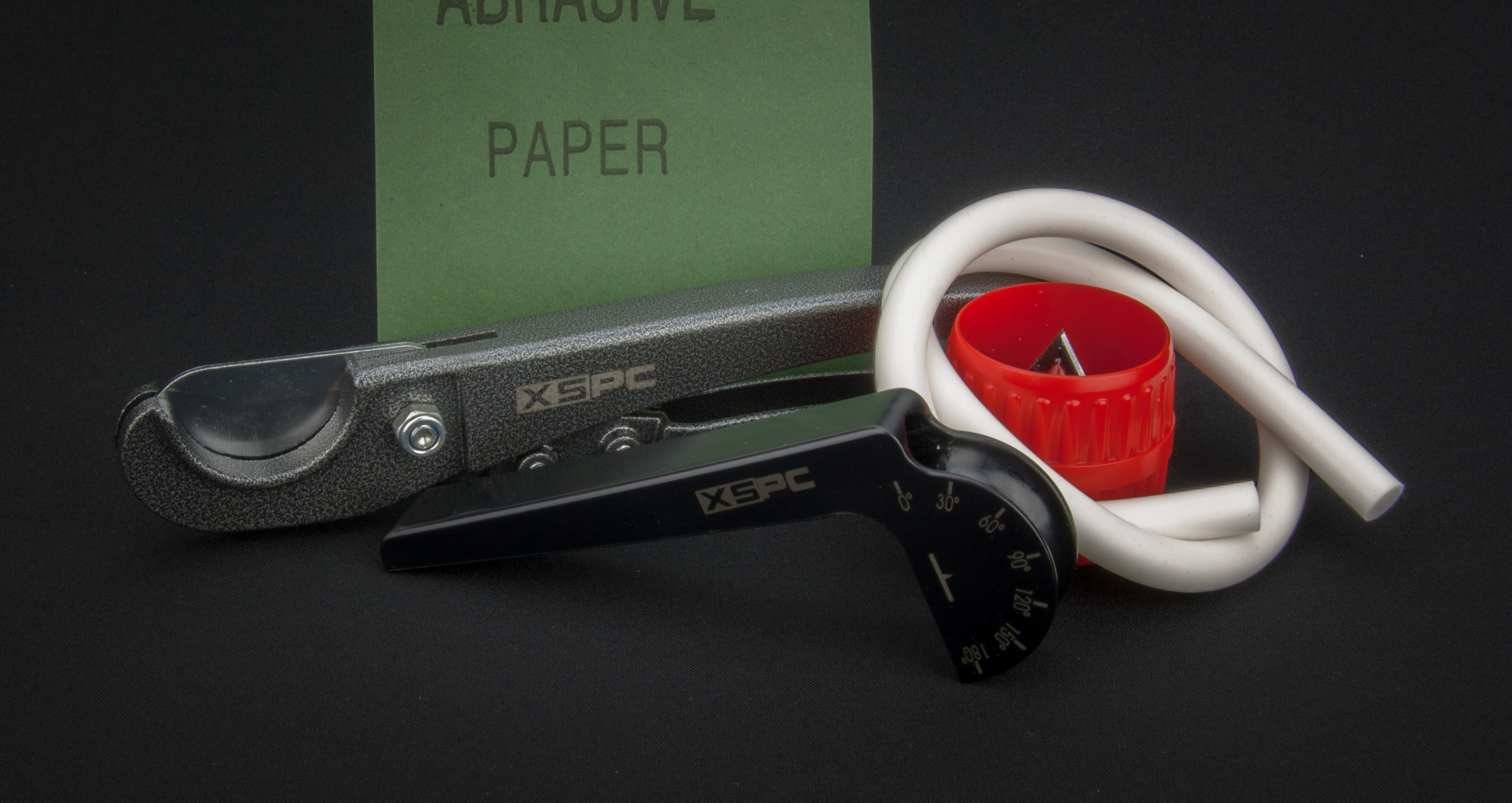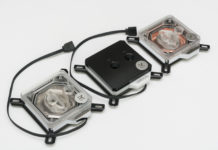Un-boxing the XSPC PETG Toolkit
The PETG Toolkit comes packaged in a sturdy box which at first glance is rather plain and boring.
 Closer Inspection reveals the XSPC logo is gently embossed on the top of the box. A nice little touch, although difficult to photograph.
Closer Inspection reveals the XSPC logo is gently embossed on the top of the box. A nice little touch, although difficult to photograph.
 On the back is a product ID sticker along with a wonky quality control sticker.
On the back is a product ID sticker along with a wonky quality control sticker.
 Flipping the lid we find a glossy color checklist and instruction sheet laying over the items beneath.
Flipping the lid we find a glossy color checklist and instruction sheet laying over the items beneath.
 Not very often these days do glossy printed instructions make their way into product boxes, so this is a nice inclusion from XSPC.
Not very often these days do glossy printed instructions make their way into product boxes, so this is a nice inclusion from XSPC.
Under the sheet we find each item has been individually packaged and carefully placed.

The top RHS corner of the instruction sheet has a contents list of what the toolkit contains.

We’ll use the listed order to display out photos of each item. Additionally along with each item we’ll add the brief description as listed by XSPC.
Heavy Duty Hose Cutter
“The heavy duty cutter can cut through PETG tubing as effortlessly as you would cut flexible PVC tubing. Easily cut PETG rigid tubing without the need for a saw.”

The chrome-manganese steel blade is fixed to the lower handle with the 2 smaller cap head bolts, and the top handle pivots on the bolt which has a lock nut on the other side. The ability to take the cutters apart for blade re-sharpening is a feature we like and should add longevity to the this cutting tool’s life.


 The spring action travel is smooth and aided by some grease which has been applied to both sides of the blade around the pivot screw hole.
The spring action travel is smooth and aided by some grease which has been applied to both sides of the blade around the pivot screw hole. Our 1st impression of the cutting tool is that it is a quality piece of kit, and we can see these lasting for years in every water-cooler’s toolbox.
Our 1st impression of the cutting tool is that it is a quality piece of kit, and we can see these lasting for years in every water-cooler’s toolbox.
PETG Easy Bending Tool
“This tool allows you to easily bend PETG tubing at an angle between 0 and 180 degrees. Just heat the tubing with the bending rubber inserted, insert the tube into the tool and bend it to the required radius. This simple tool takes the guess work and difficulty out of bending rigid tube.”
The bending tool is packaged in a zip-lock bag that has a sticker with it’s description product code.
 The bending tool is made from ABS plastic, which makes it very light as well as having good resistance to chemicals, heat and impact.
The bending tool is made from ABS plastic, which makes it very light as well as having good resistance to chemicals, heat and impact.
 On one side of the tool is the XSPC logo as well as degree marker on the bending curve. The 0° to 180° markers are set out in 30° increments.
On one side of the tool is the XSPC logo as well as degree marker on the bending curve. The 0° to 180° markers are set out in 30° increments.
 We can’t help that think that a 45° marker would have been a sensible inclusion.
We can’t help that think that a 45° marker would have been a sensible inclusion.
 The degree markers are only on one side of the tool.
The degree markers are only on one side of the tool.
 Being right handed it felt natural for me to hold the tool in my left hand while handling the tube with my right hand. For left handers, this might feel unnatural, and perhaps it might have been an idea to print the markers on both sides of the tool.
Being right handed it felt natural for me to hold the tool in my left hand while handling the tube with my right hand. For left handers, this might feel unnatural, and perhaps it might have been an idea to print the markers on both sides of the tool.
The bending tools handle could be described as a hollow cut away of a 14mm tube and has a taper which goes from about 1/3 tube circumference near the end of the handle up to about 5/6 of the tube size just before the bend section.


 The 14.2mm cradle in the bending tool’s handle is a perfect match for XSPC’s 10/14 (14mm OD) PETG tubing.
The 14.2mm cradle in the bending tool’s handle is a perfect match for XSPC’s 10/14 (14mm OD) PETG tubing.
We measured an XSPC PETG Tubing sample to have an OD of 13.91mm.
 The slightly undersized tube could lead to compatibility issues with some 14mm hard-line fittings, but makes for a perfect fit with the bending tool.
The slightly undersized tube could lead to compatibility issues with some 14mm hard-line fittings, but makes for a perfect fit with the bending tool.
With a label affixed the tube had to be coaxed through the insertion point of the bender, while fresh clean tube slid in nicely and was a snug fit.

This last photo shows the ~10mm long “wings” just before the curved section of the tool starts. These wing appear to assist in keeping the tube lined up with the back of the handle. Gripping the handle and tube during the bend keeps this section of the tube straight.

Bending Rubber
“Solid rubber extrusion for bending PETG tubing. Insert into the tube before bending, to stop the PETG tube kinking, or deforming.”
Normally I would call this a silicone insert, however XSPC have chosen to call their bending cord “rubber” so at this point in time we’ll have to take XSPC’s word and assume that is is derived an organic based rubber compound.
However, having said that, we have used both “rubber” and silicone cord previously and based on that, we believe that the XSPC bending cord is a silicone based rubber.
Wiki Exerpt: “Organic rubber has a carbon-to-carbon backbone which can leave it susceptible to ozone, UV, heat and other ageing factors that silicone rubber can withstand well.”
“Silicone is an inorganic polymer, and the technically correct term for the various silicone rubbers is polysiloxanes or polydimethylsiloxanes. Silicone rubber offers good resistance to extreme temperatures, being able to operate normally from −100 to 300 °C (−148 to 572 °F). Some properties such as elongation, creep, cyclic flexing, tear strength, compression set, dielectric strength(at high voltage), thermal conductivity, fire resistance and in some cases tensile strength can be—at extreme temperatures—far superior to organic rubbers in general, although a few of these properties are still lower than for some specialty materials. Silicone rubber is a material of choice in industry when retention of initial shape and mechanical strength are desired under heavy thermal stress or sub-zero temperatures. This makes silicone rubber one of the elastomers of choice in many extreme environments.”
As with the bending tool the bending insert is bagged and labelled.

While unable to photograph the length, we can inform you the the insert in out sample kit was a smidge over 50cm long or almost 20″ in the old scale.
The measured diameter of the insert was 9.89mm.
 This ~9.9mm diameter of the insert appears to be a pretty good match for the 10.65mm ID of the XSPC’s PETG tubing. We note that the specification of XSPC’s PETG tubing has a 10mm ID, so something is not quite right here and we suspect it is a wrong ID size listed for the tube.
This ~9.9mm diameter of the insert appears to be a pretty good match for the 10.65mm ID of the XSPC’s PETG tubing. We note that the specification of XSPC’s PETG tubing has a 10mm ID, so something is not quite right here and we suspect it is a wrong ID size listed for the tube.
 Clear PETG ID measured above, with white PETG below. Both have virtually identical ID measurements which as mentioned previously is bigger than the 10mm specified.
Clear PETG ID measured above, with white PETG below. Both have virtually identical ID measurements which as mentioned previously is bigger than the 10mm specified.

PETG Chamfer Tool
“Quickly chamfer the edges of PETG tubing by using this handy tool. Just insert the tubing and turn anticlockwise.”
The chamfer tool comes in it’s own little box.
 We suspect the separate box has something to do with the extremely sharp and pointy end of the tool.
We suspect the separate box has something to do with the extremely sharp and pointy end of the tool.
 The tool is also bagged within the box.
The tool is also bagged within the box.

 Here we see the end of the tool for cleaning up the inside edge of the tube.
Here we see the end of the tool for cleaning up the inside edge of the tube.

Below the end of the tool used for chamfering the outside lip of the tubing.

 The blades on both ends are honed on one side only, so it is important to remember to rotate the correct way or a poor result is a certainty.
The blades on both ends are honed on one side only, so it is important to remember to rotate the correct way or a poor result is a certainty.
The chamfer tool seems ginormous.

 When compared side by side to the 14mm tube which it will be used on, the jumbo size of the chamfer tool is more easily conveyed.
When compared side by side to the 14mm tube which it will be used on, the jumbo size of the chamfer tool is more easily conveyed.
PETG Edging Sandpaper
“Ideal for sanding the edges of PETG tubing, after using a chamfer tool.”
Not much to say about this one.
 Included is a single piece of #1200 wet & dry paper which measures 13.5cm x 10cm.
Included is a single piece of #1200 wet & dry paper which measures 13.5cm x 10cm.

All in all the kit seems like a complete package to kick-start some PETG hardline work. Let’s see how they stand up to a bit of practical use.















